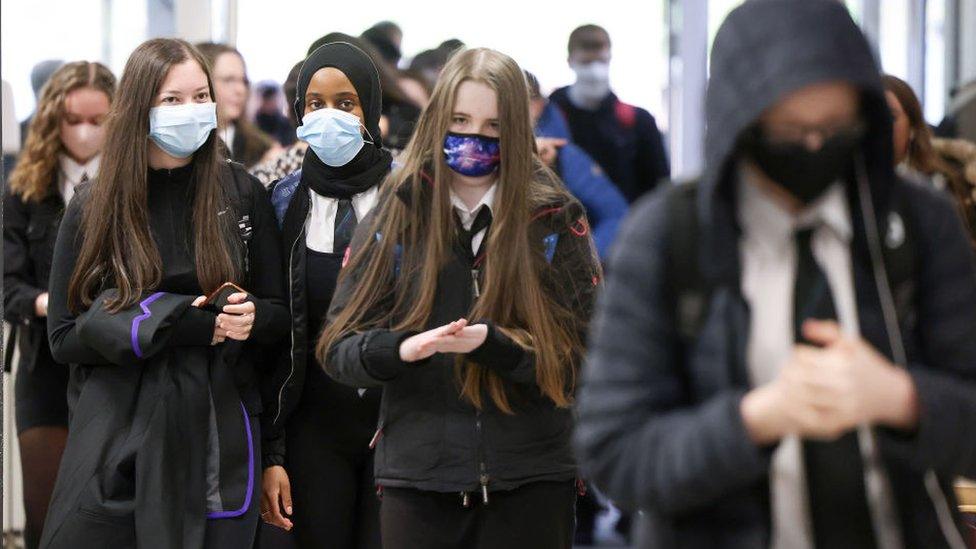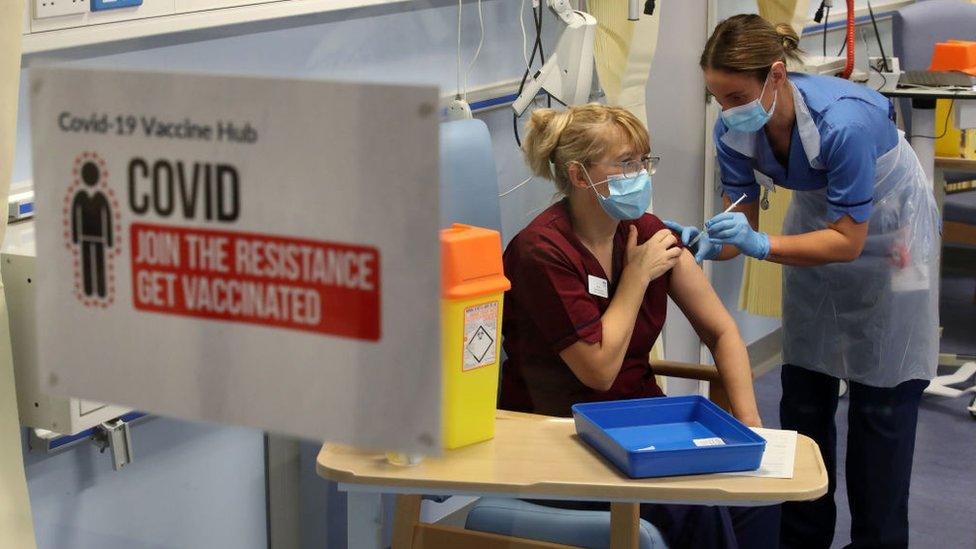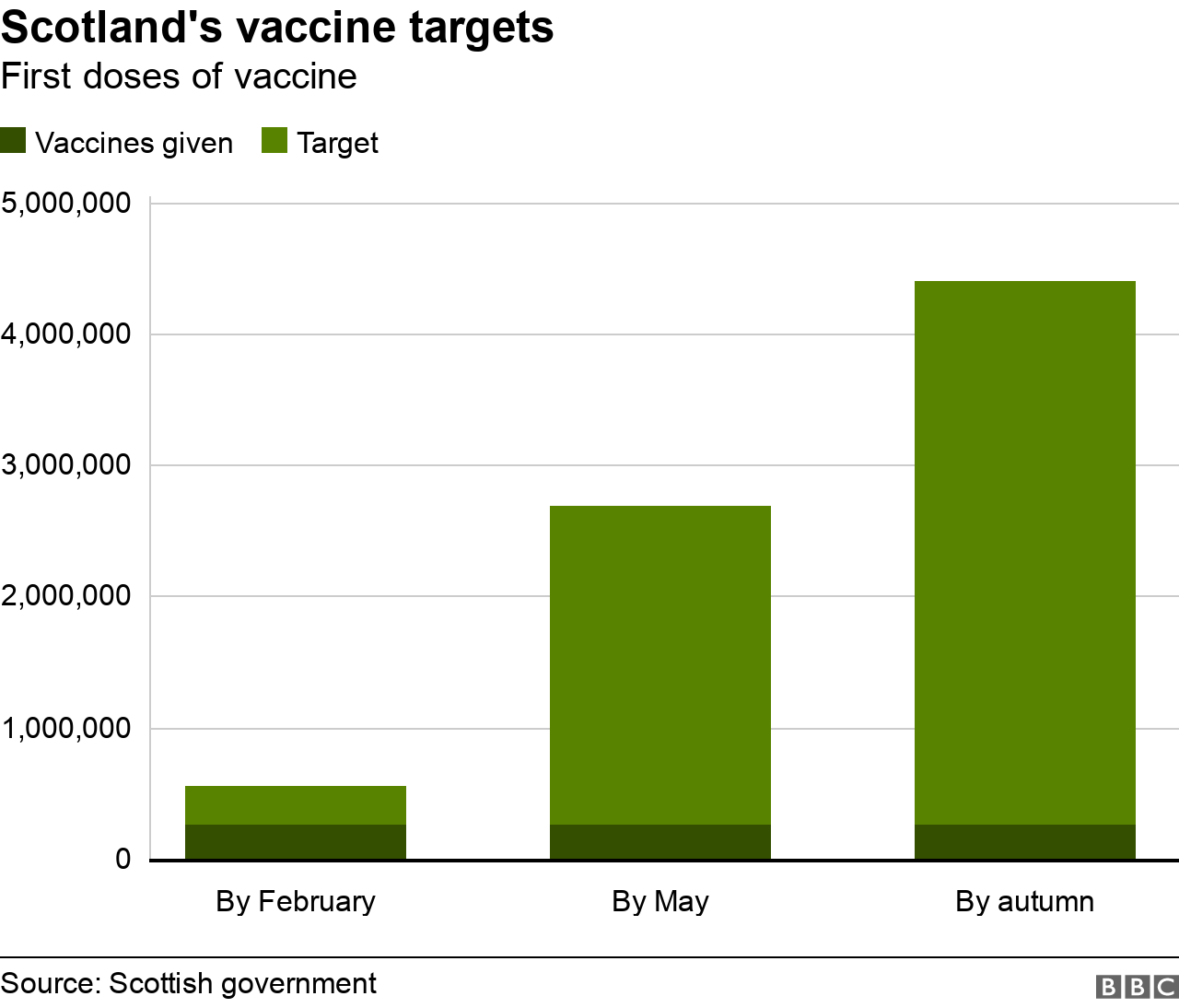Covid in Scotland: Schools to stay closed as lockdown extended
- Published
- comments
Covid in Scotland: Schools to stay closed until mid-February at least
Scotland's Covid-19 lockdown has been extended until at least the middle of February, with most school pupils to continue learning from home.
First Minister Nicola Sturgeon told MSPs that transmission of the virus appeared to be declining but was still too high to ease restrictions.
But she hopes schools will be able to at least begin a phased return to the classroom in the middle of next month.
The level four restrictions have been in place since Boxing Day.
Meanwhile the islands of Barra and Vatersay are being moved into the top level of restrictions due to a "significant outbreak" there.
The current restrictions, which have closed non-essential shops and seen a "stay at home" message put down in law, had been due to expire at the end of this month.
But Scottish government ministers agreed they should be extended after a cabinet meeting on Tuesday morning.
Ms Sturgeon told MSPs that lockdown was "beginning to have an impact" on the number of new infections, but said Scotland remained in a "very precarious position".
She added: "We need to be realistic that any improvement we are seeing is down, at this stage, to the fact that we are staying at home and reducing our interactions.
"Any relaxation of lockdown while case numbers, even though they might be declining, nevertheless remain very high, could quickly send the situation into reverse."

The vast majority of Scottish pupils have been home learning since the Christmas holiday
The announcement came as 1,165 new cases of Covid-19 were registered in Scotland, representing 11.1% of tests carried out.
A total of 1,989 people are in hospital with the virus while a further 71 deaths of people who recently tested positive have been logged.
Ms Sturgeon said there was "real and severe" pressure on health services, with around 30% more patients in hospital than at the peak of the first wave in April 2020, and that this was "almost certain to rise for a further period yet".
School buildings and nurseries have been closed to most pupils since the start of term, with all but the children of some key workers and vulnerable pupils learning from home.


Not only will schools remain closed to most pupils until at least mid-February, they are unlikely to return to normal at that point.
The first minister has indicated that her aim is to begin a phased return, if coronavirus allows. So what might that mean?
The groups that will get back into class first are likely to include secondary school exam year pupils, the youngest primary school children and those in P7 getting ready to move to high school.
For others, online learning is likely to last a bit longer.
Both the return to school and the continuation of the wider lockdown will be reviewed again in a fortnight on 2 Feb.
By that week, first doses of vaccine should have been offered to all over 80s in Scotland as well as frontline NHS and social care staff and care home residents.
With only 15-20% of the over 80s reached so far, opposition parties think the programme is slipping behind schedule, which the first minister denies.

Ms Sturgeon said she knew how "challenging and stressful" home schooling was for families, but said community transmission was "too high" to allow a safe return to classrooms.
She said: "If it is at all possible, as I very much hope it will be, to begin even a phased return to in-school learning in mid-February, we will.
"But I also have to be straight with families and say that it is simply too early to be sure about whether and to what extent this will be possible."
Statistics released on Monday showed that Scotland had vaccinated 6% of its adult population so far - the same percentage as Wales, but lower than the 8% that have been vaccinated in England and 8.7% in Northern Ireland.
England has also given a second dose of the vaccine to 427,386 people, compared to only 3,698 in Scotland.
Ms Sturgeon said approximately 100,000 people were being vaccinated per week in Scotland, and that health teams were "on track" to expand this to 400,000 per week by the end of February.

Statistics have suggested the vaccination programme in Scotland is currently lagging behind England
More than 90% of care home residents have now been given a first dose, along with 70% of care home staff and 70% of all frontline health and care workers.
The first minister said the focus on care homes - where it is "time consuming and labour intensive" to give out jabs - was "why overall figures are at this stage lower than in England", where more over-80s have received the vaccine.
She said the "pace of progress in the over-80s group is also now picking up", and that the government remained on track to hit its target of completing everyone on the priority list by early May.
Scottish Conservative group leader Ruth Davidson said the Scottish government were "lagging behind their own targets" on vaccination, saying the focus on care homes "doesn't explain how slowly the vaccine is reaching GP surgeries and the public".
She read out a series of letters from elderly people who had not been contacted about getting a jab, saying they were "anxious they don't get left behind".

Ms Sturgeon said she would not apologise for "prioritising the most vulnerable first", saying all four UK nations were "working to the same targets".
Scottish Labour's interim leader Jackie Baillie asked if Ms Sturgeon was confident the government could hit its "critical" targets, saying GPs were still complaining about "patchy" distribution of vaccines.
The first minister replied that her government would hit its goals, saying it was "always the intention" to increase the pace of vaccination as infrastructure and supplies became available.
This would see care home residents, healthcare staff and all over-80s get a first dose by the start of February, with over-70s and those deemed "extremely vulnerable" by mid-February and all over-65s by the beginning of March.

